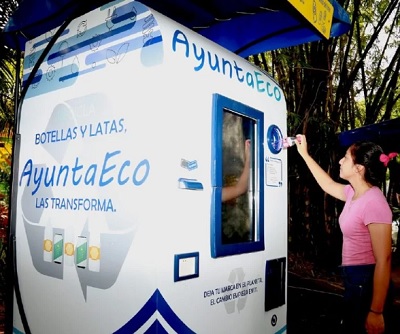The modules of the pilot project “AyuntaEco” will be installed in well protected places such as in the Centennial and Animaya parks, among other public buildings.
This technology is already patented with intellectual property rights registered by DW Media, a private company.
DW Media’s CEO, William Lopez Rodriguez, explained that the modules work in the same way vending machines do, but in reverse (“reverse vending machine mechanism”); that is, instead of depositing money to obtain a product, the user deposits the product inside the machine, and gets rewards in return.
This machine, developed and manufactured entirely in Mérida by this 100% Yucatecan company, can hold up to 200 kilos of plastic items in a container of 1.2 cubic meters.
The appliance uses electric power, but is equipped with a unit that keeps it running in the event of a power failure or suspension; it has an integrated Wi-Fi connection that allows administrators to monitor the machine remotely, as it emits a signal when it is within reach of its maximum capacity.
In addition, it generates a daily breakdown of the number of containers, divided by capacity, brand and type of drink, generating a full report. A closed circuit camera records the plastic recolection operation.
“These machines are 100% user-friendly, which is a big advantage for the people of Mérida,” explained the executive.
The module has a mailbox to deposit the plastic containers one by one, and the screen shows the description of each one, as well as the quantity and other details.
Once deposited, the “Finish” button is pressed on the screen and immediately the four options appear: cash delivery, printing of tickets for the Zoo, use the money as payment for property taxes, or donation to charity causes. When choosing any of the last three, the machine delivers a ticket as proof of the operation.
At the moment, only the option related to the tickets for the Animaya and Centenario Zoos is active.
The businessman said that the purpose of collecting plastic waste is obviously to recycle it, so the plastic container or can needs to be in good conditions, with a visible barcode, because in this way the machine classifies product.
“We believe that this type of technology is necessary in smart cities, where both government and citizens seek mechanisms that encourage recycling as a way of life, increasing sustainability, and as an end to support charity causes”, he added.
Lopez Rodriguez said the potential of this project may be much larger because these modules can be installed in places where higher incidence of plastic containers concentration is reported, such as concerts, or other kind of massive events.
The modules can be geo-referenced and located with mobile devices, so citizens know where they are installed.
For the time being, these two first modules are being installed in the parks of El Centenario and Animaya, where exchange their plastic waste for tickets for the attractions offered at these recreational sites.
Source: yucatan.com.mx



